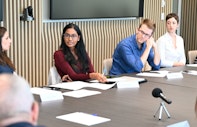What Bahá’ís Do
Nineteen Day Feast
Overview
- What Bahá’ís Believe
- Overview
- Bahá’u’lláh and His Covenant
- The Life of the Spirit
- God and His Creation
- Essential Relationships
- Universal Peace
- What Bahá’ís Do
Once in every nineteen days, meetings are held in every locality by the Bahá’í community. Known as the “Nineteen Day Feast”, these gatherings serve as the bedrock of Bahá’í community life.
The Feast was ordained in the Kitáb-i-Aqdas by Bahá’u’lláh; He counseled His followers to meet once every Bahá’í month, even if “only water be served”. “This feast”, states ‘Abdu’l-Bahá, “is held to foster comradeship and love, to call God to mind and supplicate Him with contrite hearts, and to encourage benevolent pursuits.” “It rejoiceth mind and heart”, He writes in another passage. “If this feast be held in the proper fashion, the friends will, once in nineteen days, find themselves spiritually restored, and endued with a power that is not of this world.”
Although the Nineteen Day Feast may assume different outward forms in different parts of the world, reflecting the conditions and customs of the local community, its program always includes the reading of prayers, a portion devoted to sharing news and consulting on community affairs, and a portion for socializing and fellowship. The Nineteen Day Feast provides an opportunity for the community to gather and discuss its affairs, and for the Local Spiritual Assembly—the local governing council of the Bahá’í community—to keep abreast of the concerns of the community and strengthen its relationship with it. Consultation at these regular gatherings also creates a space for growing social consciousness to find constructive expression and often leads to the emergence of small groups engaged in action.
On a given day every month, then, in tens of thousands of localities in virtually every territory on the planet, groups of friends gather together in a spirit of love to pray, to think about their own spiritual growth, and to consult about their individual and collective efforts—modest though they may be—to improve the life of their communities. In each instance the consultations are guided by the same vision of a better world, and the participants—men and women, young and old alike—evince a remarkable degree of unity, not only in their shared convictions about the fundamental principles that are to characterize this better world, but also in the methods and approaches that they adopt in their daily lives to contribute to its gradual realization.




